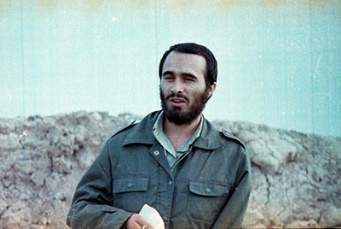Eliciting Aspects of Shahid Kharazi’s Management from Oral History
Maryam Asadi Jaafari
Translated by: Zahra Hosseinian
2019-09-24
The defend session of PhD thesis, entitled "Historical Analysis of Shahid Hossein Kharrazi’s Management in 14-Imam Hossein Division during the Iran-Iraq War" by Mehri Askari, was held on September 7, 2019 at the Faculty of Literature and Humanities, University of Isfahan.
According to the Iranian Oral History Website, this thesis has been compiled under the guidance of Dr. Asghar Foroughi Abri, with the advice of Dr. Abolhassan Fayaz Anoush, and with the efforts of Mehri Askari, a graduate of History of Islamic Iran. Dr. Aladdin Shahrokhi, Dr. Mostafa Pirmoradian, and Dr. Bahman Zeinali also supervised the thesis. Askari gained a high grade after defending her thesis.
In this doctoral thesis, researcher has studied and analyzed the spiritual, social, and military aspects of this sacred defense commander, focusing on documents, library resources, and oral history interviews with more than one hundred fellow warriors, friends and family of Shahid Hossein Kharrazi; and at the end, she has explained the managerial character of this war commander.
Askari, at the beginning of her defense, said about the background of the research on the management aspects of Shahid Kharrazi: "This issue was proposed by the Isfahan Corps to the University of Isfahan and I chose it because it was a matter of interest to me, even though it was very hard but great. Prior to this thesis, most of the books on Shahid Kharrazi were a kind of memory writing, and the management of Shahid Kharrazi as a war commander had not been studied scientifically."
On the importance of the research, she said: "The importance of this research can be summarized in utilizing Shahid Kharrazi's management experience in textbooks and military and defense training centers, preserving valuable sacred defense experiences and transferring its achievements to the next generation, and analysis historically the discussion in question."
Askari pointed to the challenges ahead in recording the oral history of the war, and in particular, Shahid Hossein Kharrazi: "Since it was a military research, three military advisers covered the military and operational sectors from the beginning to the end of the investigation. I also interviewed with more than a hundred people, but some of them didn't even allow me to name them in the thesis. The confidentiality of some of the documents was another limitation of the investigation. I worked with the late Dr. Hossein Ardestani, then head of the Sacred Defense Document and Research Center, and he provided me with the largest audio, video and wireless conversations of the 14-Imam Hossein Division in various operations. But I was not allowed to write some of these documents and only read them. The oral history department of the Isfahan Corps was recently activated. It cooperated with me for less than a year on this thesis, and after a while, to maintain the historical aspect of the thesis, I continued working at my own expense."
The questions of "Historical Analysis of Shahid Hossein Kharrazi’s Management in 14-Imam Hossein Division during the Iran-Iraq War" PhD thesis were based on studying Shahid Kharrazi's management in 14-Imam Hossein Division, the impact of different dimensions of his management on the process of war, and distinctive features of the Shahdi Kharrazi with his fellow warriors.

The fourth chapter of this thesis has begun with studying the managerial personality and military management of Shahid Hossein Kharrazi in Darkhovin Front, in Samenolaemeh operations, organizing Imam Hossein Brigade, and the role of Shahid Kharrazi in relation to them. Also, his commanding has been investigated in operations of Walfajr 1, 3 and 4, Khyber, Karbala 3, 4 and 5, Walfajr 8 and Badr until the martyrdom of the commander of 14-Imam Hossein Division, based on oral history interviews and available documents.
The fifth chapter also has analyzed the aspects of social, psychological, economic, military, political, spiritual and cultural management of Shahid Kharrazi and its typical specimens and unsuccessful operations; and finally, a model has formed based on the contexts of his spiritual, social and military personality and then reached to the managerial personality of Shahid Hossein Kharrazi.

Number of Visits: 5757
http://oral-history.ir/?page=post&id=8801
